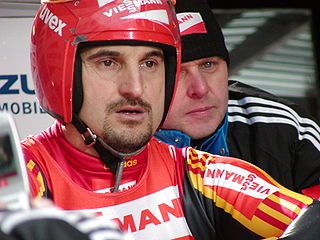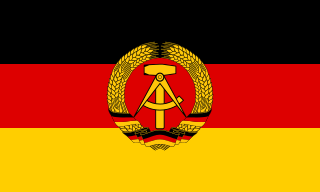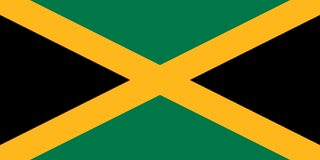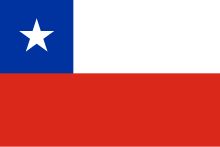
Georg Hackl is a German former luger who was three time Olympic and World Champion. He is known affectionately as Hackl-Schorsch or as the Speeding Weißwurst a reference to what he looks like in his white bodysuit coming down the luge at fast speeds.

The Olympic Oval in Calgary, Alberta, Canada, is North America's first covered speed skating oval; it was built for the 1988 Winter Olympics and opened 33 years ago on September 27, 1987. Located on the University of Calgary campus, it is the official designated training centre for Speed Skating Canada and the Elite Athlete Pathway.
The 1988 Winter Olympics, officially known as the XV Olympic Winter Games, was a winter multi-sport event held in Calgary, Canada, from 13 to 28 February 1988. A total of 1,423 athletes representing 57 National Olympic Committees (NOCs) participated in 46 events from 10 different sports and disciplines. Five new events were contested at these Games—men's and women's Super G in alpine skiing, team events in Nordic combined and ski jumping, and women's 5000 metres in speed skating—and two events returned to the program—men's and women's combined in alpine skiing.

Curling was included in the program of the inaugural Winter Olympic Games in 1924 in Chamonix although the results of that competition were not considered official by the International Olympic Committee until 2006. Curling was a demonstration sport at the 1932 Games, and then again after a lengthy absence in 1988 and 1992. The sport was finally added to the official program for the 1998 Nagano Games.

Canada was the host nation for the 1988 Winter Olympics in Calgary. It was the first time that Canada had hosted the Winter Olympic Games, and second time overall, after the 1976 Summer Olympics in Montreal. Vancouver would eventually host the 2010 Winter Olympics which makes it the second city in Canada to host the Winter Olympics and the third overall.

Alpine skiing has been contested at every Winter Olympics since 1936, when a combined event was held in Garmisch-Partenkirchen, Germany.
Curling was a demonstration sport at the 1988 Winter Olympics. The venue was the Max Bell Arena in Calgary.

Nakiska is a ski resort in western Canada, in the Kananaskis Country region of the province of Alberta. It is located 83 km (52 mi) from Calgary, west on Highway 1 and south on Highway 40. "Nakiska" is a Cree word meaning "to meet" or "meeting place."

The Union of Soviet Socialist Republics competed at the 1988 Winter Olympics in Calgary, Alberta, Canada. It would be the last Winter Olympic Games before the dissolution of the USSR in 1991. Six of the former Soviet republics would compete together as the Unified Team at the 1992 Winter Olympics, and each republic would be independently represented at subsequent Games.

Italy competed at the 1988 Winter Olympics in Calgary, Alberta, Canada, winning 2 gold, 1 silver and 2 bronze medals.

East Germany competed at the Winter Olympic Games for the last time at the 1988 Winter Olympics in Calgary, Alberta, Canada. Following German reunification in 1990, a single German team would compete in the 1992 Winter Olympics.

West Germany competed at the Winter Olympic Games for the last time as a separate nation at the 1988 Winter Olympics in Calgary, Alberta, Canada. Following German reunification in 1990, a single German team would compete in the 1992 Winter Olympics.

Denmark sent a delegation to compete at the 1988 Winter Olympics in Calgary, Alberta, Canada from 13–28 February 1988. This was Denmark's first appearance at the Winter Olympic Games since the 1968 Winter Olympics 20 years prior, and Calgary was their sixth overall appearance at the winter version of the Olympics. Denmark was represented in Calgary by a single figure skater, Lars Dresler. In the men's singles, he finished in 14th place.

Luxembourg competed at the 1988 Winter Olympics in Calgary, Alberta, Canada from 13–28 February 1988. It had been 52 years since the last time the nation had participated in the Winter Olympic Games, and Calgary was only their third appearance at a Winter Olympics in history. The Luxembourgian delegation consisted of a single alpine skier, the Austrian-born Marc Girardelli. His best performance was 9th in the downhill race, and Luxembourg did not win any medals at these Olympics.

Bulgaria competed at the 1988 Winter Olympics in Calgary, Alberta, Canada.

Liechtenstein competed at the 1988 Winter Olympics in Calgary, Alberta, Canada.

Jamaica competed in the Winter Olympic Games for the first time at the 1988 Winter Olympics in Calgary, Alberta, Canada. They competed in one sport, Bobsledding, in both the two-man and four-man events and finished outside the medal places in both competitions. Athletes were recruited from the Jamaica Defence Force, which saw Dudley Stokes, Devon Harris and Michael White become the first members of the team. Caswell Allen was the fourth man, but was injured prior to the start of the Olympics and was replaced by Chris Stokes, who was only in Canada to support his brother and new teammate Dudley.

The Jamaican national bobsleigh team represents Jamaica in international bobsledding competitions. The team first gained fame during their debut in the 1988 Winter Olympic Games four-man bobsled in Calgary, Alberta, where they were seen as underdogs as they represented a tropical nation in a winter sport. The team returned to the Winter Olympics in the two-man bobsled in 1992, 1994, 1998, 2002, 2014, and with a women's team for the first time in 2018. The team either failed to qualify or did not have a team during the other Winter Olympics.
Paul Hildgartner is an Italian luger who competed from the early 1970s to the late 1980s. Competing in five Winter Olympics, he earned two gold medals and one silver medal for his efforts. At the 1984 Winter Olympics, Hildgartner carried the Italian flag during the opening ceremonies.

Slovenia first participated as an independent nation at the Olympic Games at the 1992 Winter Olympics in Albertville, France, and the country has sent athletes to compete at every Games since then. The Slovenian Olympic Committee was established in 1991 and was recognised by the International Olympic Committee on 5 February 1992.

















